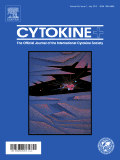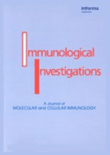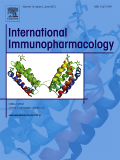
CYTOKINE
Scope & Guideline
Elevating the discourse in cytokine research and application.
Introduction
Aims and Scopes
- Cytokine Mechanisms in Immune Response:
The journal extensively covers the mechanisms by which cytokines modulate immune responses, including their roles in inflammation, immune regulation, and the pathophysiology of various diseases. - Cytokines in Disease Pathogenesis:
Research published often explores how dysregulation of cytokines contributes to disease processes, including autoimmune diseases, cancer, infectious diseases, and metabolic disorders. - Therapeutic Targeting of Cytokines:
A significant focus is on the therapeutic implications of cytokines, including the development of cytokine inhibitors and biomarker studies for predicting treatment responses. - Cytokine Profiles in Clinical Contexts:
The journal features studies that profile cytokines in clinical settings, providing insights into their roles as biomarkers for disease severity, progression, and therapeutic efficacy. - Innovative Methodologies in Cytokine Research:
There is a consistent emphasis on novel experimental approaches and technologies for studying cytokines, enhancing the field's understanding and potential clinical applications.
Trending and Emerging
- Cytokines in COVID-19 and Other Infectious Diseases:
There is an increasing focus on the role of cytokines in COVID-19, exploring cytokine storms, immune responses, and potential therapeutic interventions, reflecting the urgency of the pandemic. - Cytokine Profiles as Biomarkers:
Emerging studies are increasingly profiling cytokines as biomarkers for various diseases, particularly in relation to disease severity, prognosis, and treatment responses in conditions like cancer and autoimmune diseases. - Therapeutic Targeting of Cytokine Signaling Pathways:
Research is trending towards interventions targeting specific cytokine pathways for therapeutic benefit, particularly in cancer immunotherapy and chronic inflammatory diseases. - Cytokines and Metabolic Disorders:
There is a growing interest in the interplay between cytokines and metabolic disorders, including obesity and diabetes, with studies focusing on how cytokine signaling affects metabolic health. - Role of Non-Coding RNAs in Cytokine Regulation:
An emerging area of interest is the regulation of cytokine expression by non-coding RNAs, which opens new avenues for understanding the modulation of immune responses.
Declining or Waning
- Cytokines in Infectious Disease:
Despite the ongoing relevance of cytokines in infectious diseases, the focus on their roles specifically in classic infections (e.g., tuberculosis, malaria) seems to be waning as newer infectious diseases (like COVID-19) dominate the research landscape. - Cytokine Research in Non-Inflammatory Conditions:
Studies examining the role of cytokines in non-inflammatory conditions or purely metabolic syndromes have decreased, possibly overshadowed by more inflammatory or immune-related research. - Basic Cytokine Biology Studies:
There has been a noticeable reduction in basic studies focused solely on cytokine biology without application to specific diseases, as the field increasingly moves towards translational research. - Cytokine Interactions with Non-Immune Cells:
Research exploring cytokine interactions specifically with non-immune cells (beyond the tumor microenvironment) has seen a decline, as the focus shifts to more direct immune interactions.
Similar Journals

IMMUNOLOGICAL INVESTIGATIONS
Elevating Immunological Knowledge for Professionals and ScholarsIMMUNOLOGICAL INVESTIGATIONS, published by Taylor & Francis Inc, is a leading journal in the field of immunology and related medical sciences, with an established presence since 1972. With a focus on cutting-edge research and critical insights in immunological methods and theories, this journal serves as a pivotal platform for researchers, professionals, and students alike. Though it currently holds a Q3 ranking in Immunology and a Q2 ranking in miscellaneous medicine as of 2023, its Scopus rank of #129 out of 236 reflects its dedication to advancing the understanding of immune responses and therapies. The journal's commitment to rigorous peer review and high-quality publications enables it to remain relevant and influential in the ever-evolving landscape of immunological research. Subscription is required to access its extensive archive, which spans critical developments in the field of immunology from 1972 to 2024.

JOURNAL OF IMMUNOLOGY
Empowering the Future of Immune ResearchWelcome to the JOURNAL OF IMMUNOLOGY, a prestigious publication associated with the American Association of Immunologists and dedicated to advancing the field of immunology. With a rich history dating back to 1945, this journal is renowned for its high-impact research, evident in its notable 2023 Q1 rankings in both Immunology and Allergy, as well as its strong positions in Scopus rankings—Rank #68 in Immunology and Allergy and Rank #79 in Immunology and Microbiology. Although it operates on a subscription basis, its commitment to publishing cutting-edge studies ensures that it remains a vital resource for scientists, healthcare professionals, and students alike. As the journal continues to pave the way for innovative research and breakthroughs in immunological science, it facilitates a platform for dialogue and discovery among researchers and practitioners across the globe.

EUROPEAN JOURNAL OF IMMUNOLOGY
Unlocking the Secrets of the Immune SystemWelcome to the European Journal of Immunology, a premier peer-reviewed journal dedicated to advancing the field of immunology and allergy research. Established in 1971 and published by Wiley, this esteemed journal has been consistently ranked in the top quartile (Q1) across its categories, highlighting its significant impact within the scientific community. With an impressive Scopus ranking, the journal occupies the 64th position in Immunology and Allergy and the 74th in the broader sector of Immunology and Microbiology, demonstrating its vital role in driving innovation and knowledge in immunological studies. The European Journal of Immunology publishes high-quality original research, comprehensive reviews, and insightful commentary, making it an indispensable resource for researchers, healthcare professionals, and students dedicated to understanding the complexities of the immune system. Although not an open-access journal, it offers various subscription options to ensure that institutions and individuals can access pivotal research that shapes the future of immunology.

BMC IMMUNOLOGY
Empowering Researchers with Cutting-Edge InsightsBMC Immunology is a prominent open-access journal published by BMC that has been at the forefront of immunological research since its inception in 2000. Based in the United Kingdom, this journal aims to advance the understanding of immune system functions and disorders through high-quality, peer-reviewed articles. With an impressive scope encompassing various facets of immunology, BMC Immunology has earned a Q3 ranking in the Immunology category according to the 2023 category quartiles, demonstrating its growing impact and relevance in the scientific community. Researchers and professionals will find valuable insights in its array of published works, spanning both foundational studies and innovative applications. The journal's commitment to open access ensures that cutting-edge research is freely available, fostering collaboration and advancement in the field. For those looking to stay updated on the latest developments in immunology, BMC Immunology stands as an essential resource for researchers, professionals, and students alike.

CLINICAL AND EXPERIMENTAL IMMUNOLOGY
Advancing the Frontiers of Immunological ResearchClinical and Experimental Immunology, published by Oxford University Press, is a premier journal that has been a cornerstone in the field of immunology since its inception in 1966. With an ISSN of 0009-9104 and an E-ISSN of 1365-2249, this journal holds a significant position in academic research, currently ranking in the Q2 category for both Immunology and Allergy (2023). Its impactful contributions are reflected in its Scopus rankings, where it stands at Rank #63 out of 233 in Immunology and Allergy, placing it in the 73rd percentile, and Rank #73 out of 236 in Immunology and Microbiology. Researchers, healthcare professionals, and students will find this journal an invaluable resource for cutting-edge studies, reviews, and clinical advancements in the ever-evolving domain of immunology. While the publication does not offer open-access options, it remains a pivotal platform for disseminating knowledge that impacts both clinical practice and experimental research.

Central European Journal of Immunology
Transforming Research into Impactful SolutionsCentral European Journal of Immunology is a premier publication dedicated to advancing the field of immunology and allergy research. Established in 1996 and published by TERMEDIA PUBLISHING HOUSE LTD, this open access journal has consistently provided a platform for innovative research and comprehensive reviews since its transition to open access in 2002. With an ISSN of 1426-3912 and E-ISSN of 1644-4124, it embraces a global readership while being rooted in Poland. The journal, with a notable Q3 ranking in both the categories of immunology and allergy in 2023, positions itself within the competitive landscape of scientific discourse, as reflected in its Scopus rankings. Designed for researchers, professionals, and students, the Central European Journal of Immunology not only disseminates significant findings but also fosters collaboration and innovation in the immunological sciences, making it a vital resource for those seeking to stay current in this rapidly evolving field.

NATURE IMMUNOLOGY
Advancing immunological frontiers with groundbreaking research.NATURE IMMUNOLOGY is a premier academic journal published by NATURE PORTFOLIO, dedicated to advancing the field of immunology. With an impressive impact factor that reflects its esteemed position, this journal ranks in the top quartile (Q1) of renowned categories, including Immunology and Allergy. Serving as a crucial platform for researchers, professionals, and students, NATURE IMMUNOLOGY showcases cutting-edge research, comprehensive reviews, and insightful perspectives that drive innovation in immunological science. Based in the United Kingdom, this journal has been a vital contributor to the global discourse on immune responses and related diseases since its inception in 2000. Researchers can benefit from its rigorous peer-review process, ensuring that only high-quality studies are disseminated, thus enhancing their academic pursuits and practical applications. Explore the latest findings and trends within this flourishing discipline, making NATURE IMMUNOLOGY an essential resource for anyone engaged in the study of the immune system.

INFLAMMATION RESEARCH
Illuminating the pathways of inflammation research.INFLAMMATION RESEARCH, published by SPRINGER BASEL AG, serves as a pivotal journal in the fields of Immunology and Pharmacology, with notable rankings of Q2 in Immunology and Q1 in Pharmacology as of 2023. With an ISSN of 1023-3830 and an E-ISSN of 1420-908X, this esteemed journal, located in Basel, Switzerland, has been at the forefront of advancing our understanding of inflammatory processes since its inception in 1995. Covering research trends and breakthroughs until 2024, it significantly contributes to both the theoretical frameworks and practical applications within its discipline, boasting a strong Scopus ranking of #40/313 in Pharmacology and #56/236 in Immunology, placing it in the top percentiles for its field. Although it does not offer Open Access options, the journal remains an invaluable resource for researchers, professionals, and students committed to unraveling the complexities of inflammation and its implications in health and disease.

Autoimmune Diseases
Connecting researchers in the fight against autoimmune diseases.Autoimmune Diseases is a leading open-access journal published by Hindawi Ltd, dedicated to advancing the understanding and treatment of autoimmune disorders. Since its inception in 2010, this journal has provided a vital platform for researchers, clinicians, and students to share innovative findings and insights from the field of immunology. With an impressive Scopus ranking that highlights its relevance, particularly in the areas of Immunology and Microbiology and Immunology and Allergy, Autoimmune Diseases occupies a key position in the scientific discourse, ranking in the top quartiles across various categories. Researchers publishing in this journal benefit from a wide audience and high visibility, reflecting the increasing importance of understanding autoimmune diseases in today’s health landscape. Accessible to all, the journal promotes collaborative research and discussion, making it an essential resource for anyone dedicated to the study and management of autoimmune conditions.

International Immunopharmacology
Exploring Innovative Solutions in ImmunopharmacologyInternational Immunopharmacology, published by Elsevier, stands as a prominent journal within the disciplines of immunology and pharmacology. With an ISSN of 1567-5769 and an E-ISSN of 1878-1705, this esteemed journal is based in the Netherlands and features a robust commitment to disseminating high-quality research from its inception in 2001 through 2024. The journal has achieved impressive rankings, securing a Q1 category in Pharmacology and Q2 in both Immunology and Immunology and Allergy as of 2023. With its strategic focus on bridging the gap between immunology and pharmacological applications, International Immunopharmacology attracts a diverse readership, including researchers, healthcare professionals, and students interested in the latest advancements in therapeutic agents and immune system modulation. Furthermore, it offers an open access option, enhancing the accessibility and reach of its invaluable content. As a pivotal resource in the field, this journal not only facilitates the exchange of innovative ideas but also fosters a deeper understanding of the complexities of immunopharmacology in today’s research landscape.